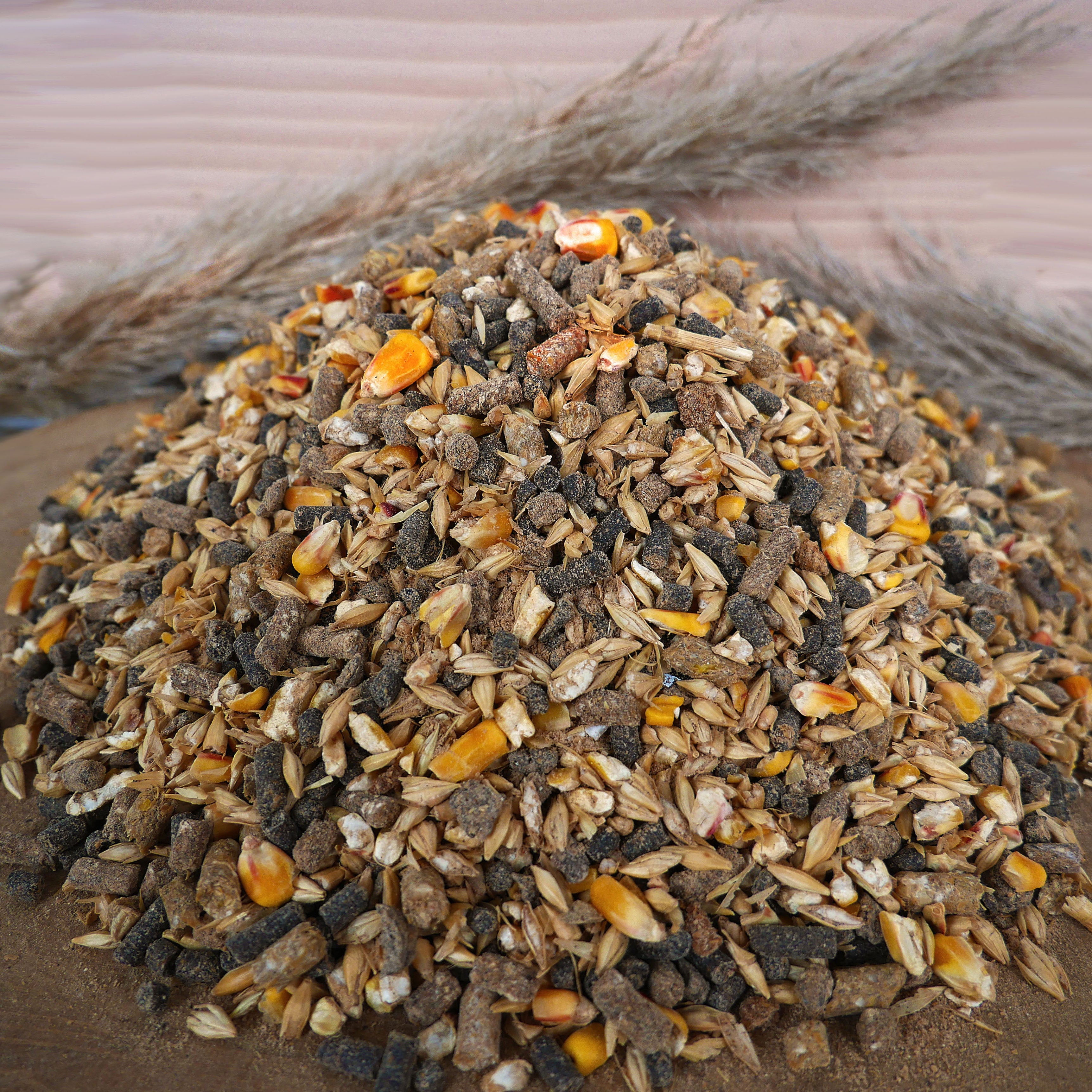
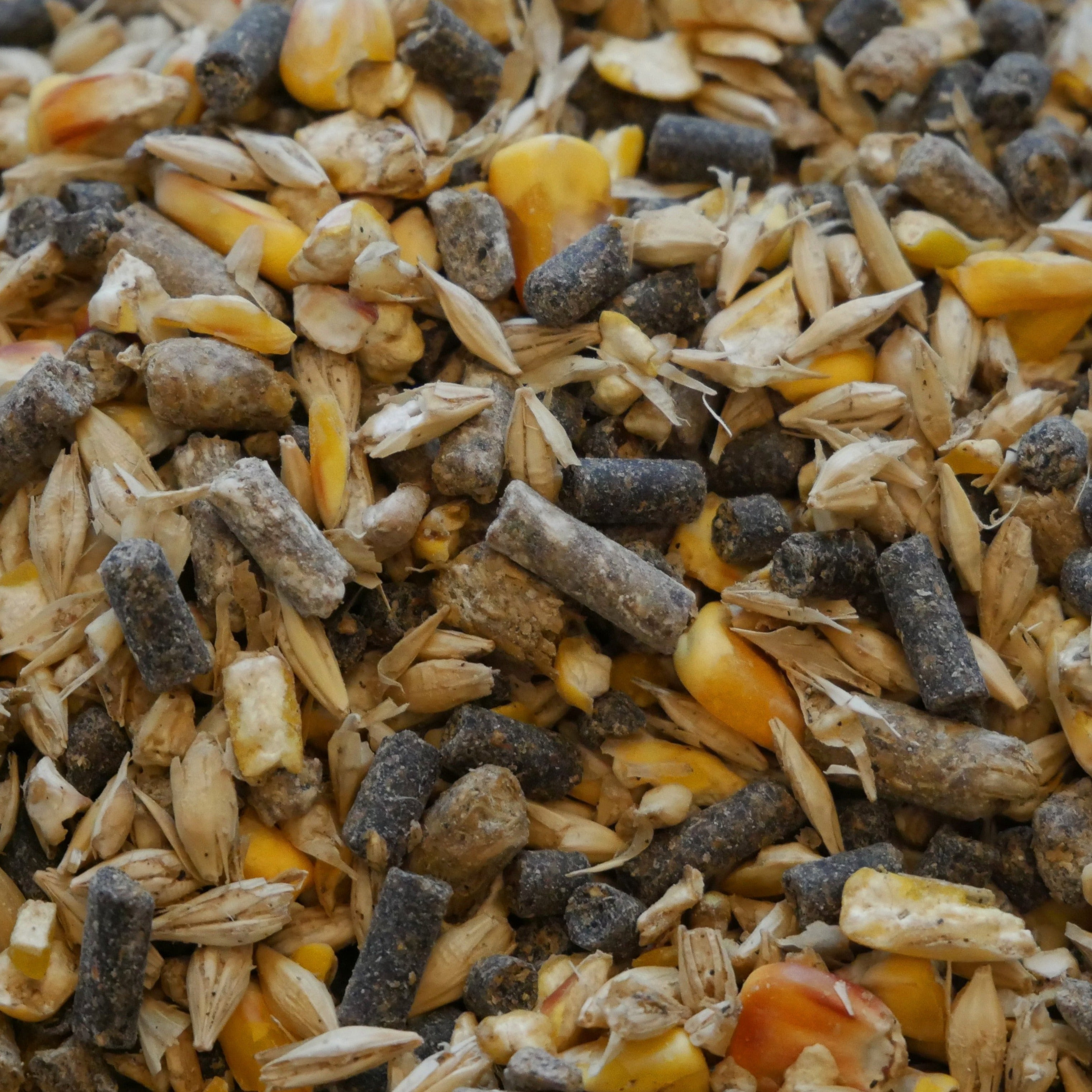
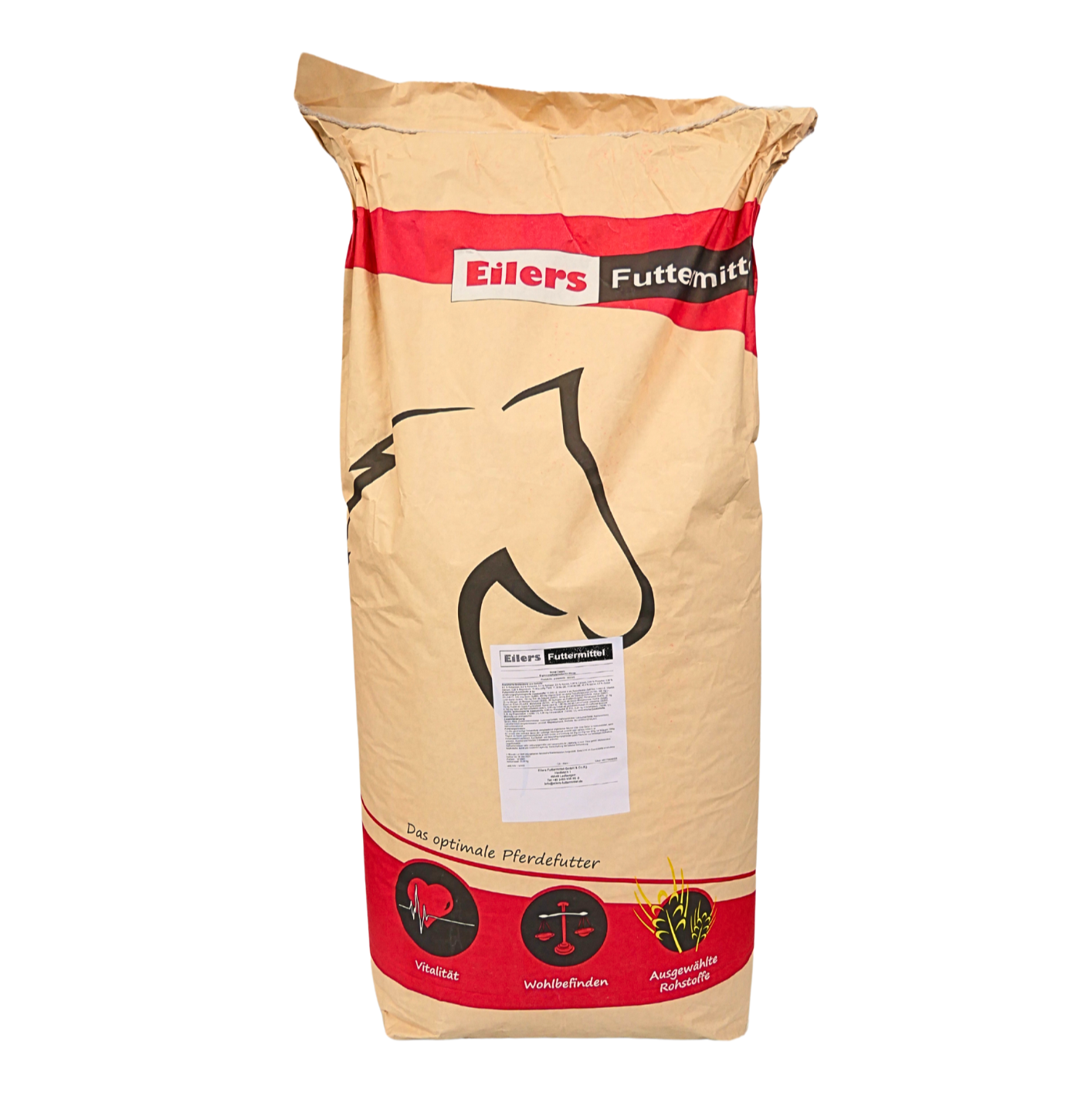
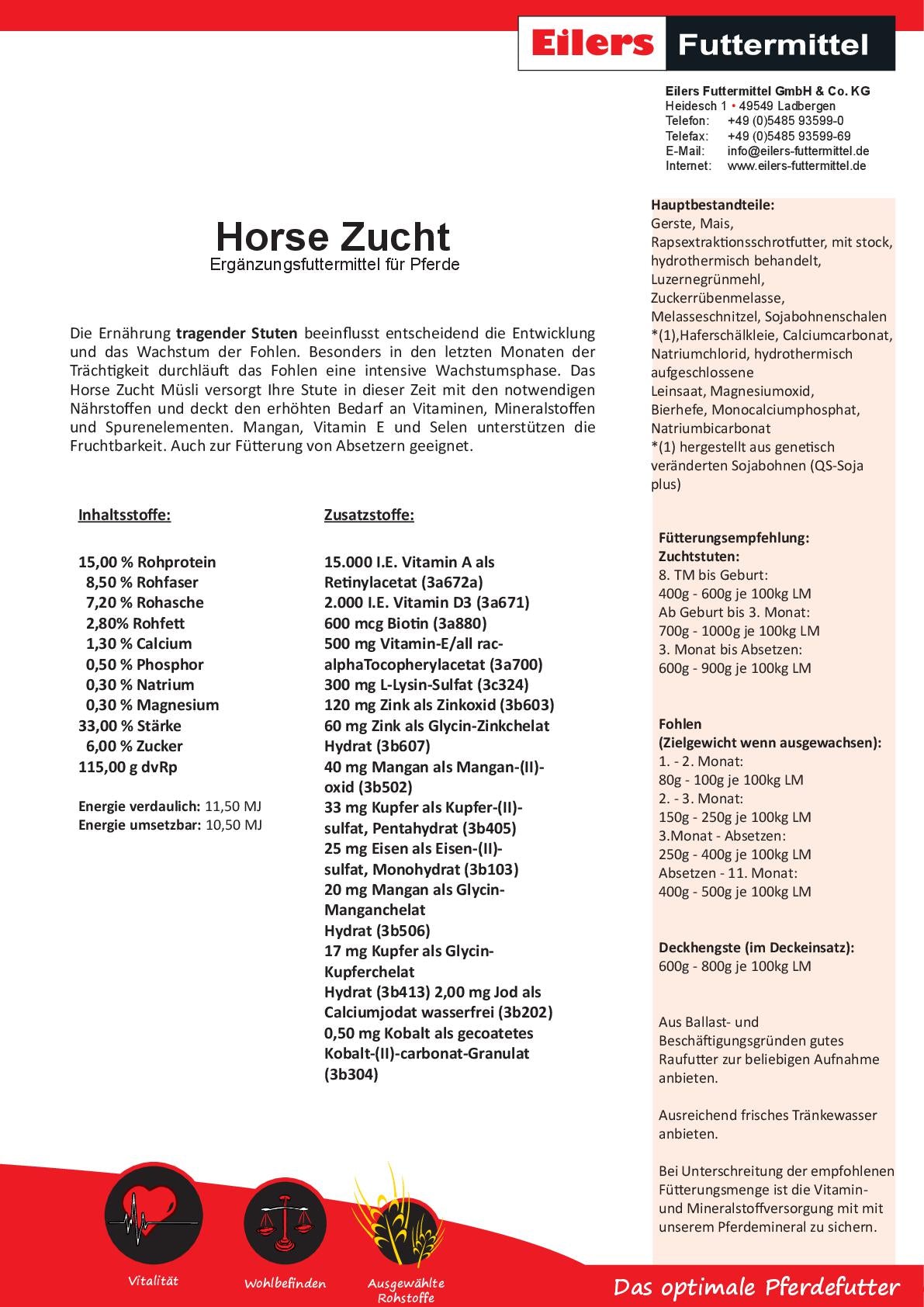
Breeding muesli - Horse breeding bagged 25 kg
Aus der Region
Angepasste Rezeptur
Schneller Versand
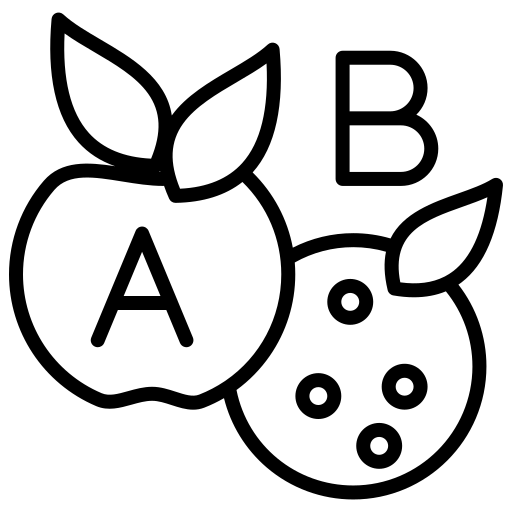
Voll Mineralisiert
Couldn't load pickup availability
Pickup available at ETS Mischfutterwerk
Usually ready in 24 hours
Produktdetails
The feeding of pregnant mares has a significant influence
on the development and growth of the foals. Especially the last
Pregnancy months are characterized by an enormous growth phase of the
The Horse Zucht Müsli provides your mare with nutrients during this time
with sufficient nutrients and covers the high demand for vitamins,
Minerals and trace elements. Manganese, vitamin E and selenium contribute
contributes to improving fertility. Also suitable for weaner feeding
suitable.
Ingredients:
15.00% crude protein
8.50% crude fiber
7.80% crude ash
2.50% crude fat
1.30% calcium
0.70% phosphorus
0.30% sodium
0.25% magnesium 115.00 g dvRp
Digestible energy: 10.83 MJ
Energy usable: 9.74 MJ
Additives:
15,000 IU Vitamin A as retinyl acetate (3a672a), 2,000 IU Vitamin D3 (3a671), 600 mcg Biotin (3a880), 500 mg Vitamin E/all rac-alpha Tocopheryl acetate (3a700), 300 mg L-lysine sulfate (3c324), 120 mg Zinc as zinc oxide (3b603), 60 mg Zinc as glycine zinc chelate, hydrate (3b607), 40 mg Manganese as manganese (II) oxide (3b502), 33 mg Copper as cupric sulfate pentahydrate (3b405), 25 mg Iron as ferrous sulfate monohydrate (3b103), 20 mg Manganese as glycine manganese chelate, hydrate (3b506), 17 mg Copper as glycine copper chelate, hydrate (3b413), 2.00 mg iodine as calcium iodate, anhydrous (3b202), 0.50 mg cobalt as coated cobalt(II) carbonate granules (3b304)
Feeding recommendation:
Broodmares:
8. TM until birth:
400g - 600g per 100kg LM
From birth to 3 months:
700g - 1000g per 100kg LM
3rd month until discontinuation:
600g - 900g per 100kg LM
Foal
(Target weight when fully grown):
1st - 2nd month:
80g - 100g per 100kg LM
2nd - 3rd month:
150g - 250g per 100kg LM
3rd month - weaning:
250g - 400g per 100kg LM
Weaning - 11th month:
400g - 500g per 100kg LM
Stallions (in breeding use) :
600g - 800g per 100kg LM
If you order 10 bags or more, you will receive a discount of €0.50 per bag.
If you order 20 bags or more, you will receive a discount of 1€ per bag.
Prices for larger containers and delivery on request.
Analytische Bestandteile
Passend dazu
If you have any questions, you are always welcome to contact us. We'll get back to you as soon as possible, within 24 hours on weekdays.
-
Shipping Information
Use this text to answer questions in as much detail as possible for your customers.
-
Customer Support
Use this text to answer questions in as much detail as possible for your customers.
-
FAQ’s
Use this text to answer questions in as much detail as possible for your customers.
-
Contact Us
Use this text to answer questions in as much detail as possible for your customers.
Unser Versprechen
Chelatverbindungen
Bessere Bioverfügbarkeit der Spurenelemente
Lysin
Für optimalen Muskelaufbau und Knochengesundheit
Biotin
Für glänzendes Fell und Verbesserung der Hornqualität
Aufgeschlossene Leinsaat
Für eine gesunde Muskulatur und Verdauung
Vitamin E
Optimale Funktion der Muskulatur, des Herzens und des Immunsystems
Bierhefe
Zur Unterstützung der Hufe und in besonderen Belastungsphasen
FAQs
Ist der Zinkbedarf mit der Fütterung Alpaka Pacos mit der empfohlenen täglichen Menge abgedeckt?
für normale, nicht dunkle Alpakas auf jeden Fall. Dunkle Tiere oder Tiere mit Hautproblemen müssen auf jeden Fall noch zusätzliches Zink bekommen.
Kann man das Futter den Alpakas zur freien Verfügung füttern?
Bei Stuten empfehlen wir ca. 2 kg zur freien Verfügung. Bei Mangelerscheinungen kann auch das Futter für mehrere Tage das Futter zu freien Verfügung angeboten werden. Über das ganze Jahr empfehlen wir dies aber nicht, da die Alpakas zu stark zunehmen und verfetten können.
Wie wendet man die Stallhygiene für Alpakas an?
Die Stallhygiene in Wasser auflösen und dann mit einer Gießkanne mit Streuaufsatz auf die Kotstellen geben. Danach alles trocknen lassen.
Ist das enthaltene Waffelmehl schädlich für Alpakas?
Nein. Es dient nur dazu den Geschmack attraktiv für die Tiere zu machen. Da nur 2 % enthalten ist und der Zuckergehalt des Futters im bzw. unter dem Durchschnitt liegt braucht man sich hier keine Sorgen zu machen. Dafür fressen es die Tiere gerne, denn was bringt ein Mineralfutter, was nicht angenommen wird.
Muss ich zu dem Futter noch zusätzlich Mineralien dazu füttern?
Zum Grunderhalt reicht unser Futter aus. Sind aber kranke Tiere oder Tiere mit Hautproblemen dabei, kann noch zuätzlich Zink oder z.B. Vitamin D gegeben werden. Da die Qualität des Grases und des Heus ebenso wichtig ist wie das Mineralfutter, sollte dieses unbedingt immer mitgetestet werden, wenn man die Mineralversorgung der Tiere sicherstellen will. Am Besten sollte dazu vorher ein Bluttest durchgeführt werden.
